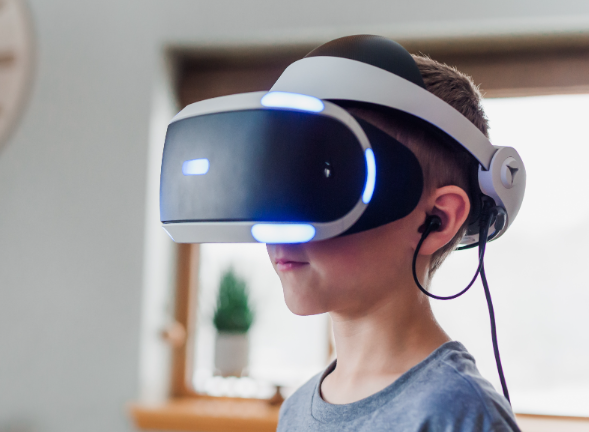In an era where technology seems to have seeped into every facet of our lives, it’s no surprise that it’s impacting the way we educate our children. With an overload of screens and digital devices, the way we consume traditional forms of media like books has shifted alongside. One such fusion of traditional wisdom and novel technology is the evolving landscape of Virtual

Reality (VR) educational games, creating an immersive and interactive reading experience, unlike any generation before them. This blog post navigates through the potential of VR-enhanced reading, reflecting on its impact on education and cognitive development.
Transforming the Learning Experience
Imagine a world where reading is no longer a solitary activity but a shared, interactive experience. This is the reality that VR books are fast forwarding into. Digital marvels, like a reading vr game or an immersive vr experiences, transport readers into the heart of stories, allowing them to experience literature in a 360-degree environment where they are part of the narrative.
Gone are the days of simply visualizing a character’s world; students can now step into them. The potential for engagement is immense – after all, who hasn’t wished they could actually wander the grounds of Hogwarts or sail on the Pequod with Ahab and Starbuck?
Engaging the Digital Generation
VR books are perfectly designed to resonate with a generation that is growing up in a world where traditional paperbacks are competing with smartphones and tablets. The interactive and visual nature of VR games are not just an innovation; they are an adaptation to the needs of a digital-centric society. Engagement through a headset creates a level of captivation that not even the most dynamic movie adaptation can achieve – because in a VR world, the reader makes the choices that guide the story.
Instilling a Love for Literature
One of the most exciting aspects of VR books is their potential not only to teach but also to foster a love for reading. By reducing the barriers to entry — familiarity with vocabulary, physical books, and traditional reading environments — VR can be the first step that leads to a lifelong romance with literature. Imagine a child who is initially a reluctant reader, but VR books allow them to approach stories in a way that feels like a game; this might just be the key to unlocking the magic of books for them.
Beyond Entertainment: Educational Potential
While the allure of VR is often equated with entertainment, its educational potential is where it truly shines. Studies have shown that immersive learning environments can lead to improved comprehension, retention, and empathy. VR books could potentially teach children complex scientific concepts by allowing them to explore a molecule’s structure, or historical events by placing them in the middle of a significant moment in time.
Bridging Emotional Gaps
Educators are also excited about VR books’ potential to bridge emotional gaps in learning. By placing students in a setting that requires them to process information in a more lifelike context, VR can enhance empathy and perspective-taking. For instance, a VR simulation that places children in different settings around the world could catalyze deeper understanding and empathy for people with diverse backgrounds and experiences.
Tailoring to Individual Learning Styles
One-size-fits-all education is becoming a relic of the past. Each child’s learning style is unique, and VR has the capability to customize the learning experience to fit the needs of visual, auditory, and kinetic learners. Interactive elements within VR books can help reinforce learning by doing, making complex topics more accessible and fun for children who might otherwise struggle in a traditional classroom.
Conclusion
Though the road ahead may be riddled with challenges, the promise that VR-enhanced reading holds for the younger generation is one worth exploring. It has the potential to revitalize the reading experience, catalyze a love for literature, and revolutionize the classroom as we know it. If harnessed responsibly, VR books could be the key that unlocks a new chapter of learning for students around the globe.



